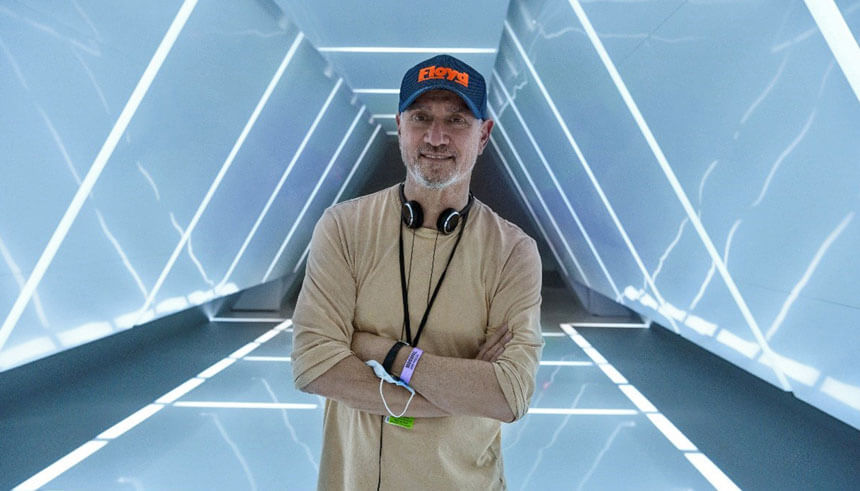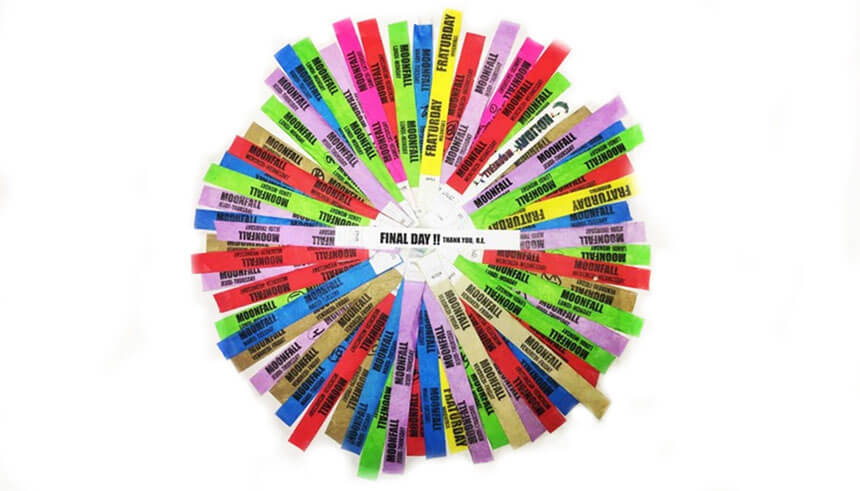East West Lifestyle
Moonfall: The Colossal $136M Independent Sci-fi Movie that Overcame All Odds
By Melody Yuan

How tenacity and creative thinking mitigated risks during COVID-19 and made this movie possible.
Imagine you’re on a critical mission with a space crew to stop the moon from colliding into Earth. That’s the premise of Roland Emmerich’s newest sci-fi epic, “Moonfall,” coming out in 2022. Known for blockbuster hits such as “Independence Day,” “The Day After Tomorrow” and “2012,” Emmerich is a film director celebrated for his ability to bring apocalyptic chaos and disaster to the big screen. Just like in “Moonfall,” everyone working on the film had to make quick pivots to overcome the many challenges that came with making a movie during a global pandemic.
“Getting an independent movie of this size and scale bonded, insured and financed during a pandemic was a major challenge,” says Emmerich. “It was a miracle and a remarkable achievement that ‘Moonfall’ happened.”
“Nothing like this has happened to the world and to the entertainment industry in the last 100 years,” adds JP Pettinato, CFO of Centropolis Entertainment, the film production company founded by Emmerich.
The complicated art of the deal and thinking outside the box during COVID-19
Prior to working with East West Bank, Pettinato had reached out to three U.S. banks and two Canadian banks. “But I had no luck because no one wanted to take on the risk,” he says. “I was exhausted and assumed that no U.S. bank would be interested in financing this movie, until I met Deborah.”
“The structure of the deal was complicated due to COVID,” says Deborah Acoca, senior vice president and relationship manager for corporate banking and entertainment at East West Bank. “But when [Pettinato] asked me if I could do it, I answered that I needed to look into details, but I was confident we could do it.”
“Centropolis is absolutely grateful to have met East West Bank’s team these past few years in Cannes and Shanghai. We are thrilled that our relationship has grown since and has allowed for ‘Moonfall’ to become a reality in the midst of one of the greatest challenges humanity has faced since World War II,” says Centropolis Entertainment President, Marco Shepherd.
Film insurance coverage
Despite the risk, Emmerich and the team were determined to continue making the movie. The team packed their bags and flew to Montreal, Canada, where filming was set to take place. “Since the initial worldwide shutdown in March 2020, I was working with various lawyers, completion guarantors and producers on how to restart production financing,” says Acoca. “So, when Pettinato and the team reached out, I knew the risks that needed to be mitigated and figured out how to adapt it specifically to ‘Moonfall.’”
To understand just how complicated this deal was, there needs to be context around what the onset of COVID-19 meant for the film industry. With productions halted across the world, many insurance companies have also had to hit pause on policies around the pandemic. As a result, many movies and shows could not resume production without proper insurance since much of the financing is tied to having those insurance policies and completion bonds in place.
It’s especially important to lock in insurance early at the pre-production stage. “I have become a consultant to a lot of movies that are in trouble, because I’ve worked on over 40 films and have had a lot of experience navigating difficult situations,” says Pettinato. “And when it comes to binding insurance policies in pre-production, you sometimes get people who want to save money and don’t want to pay for insurance early on, only to lose thousands, or millions, of dollars and end up never even shooting the movie.”
Prior to the pandemic, Pettinato was able to secure insurance coverage early. “I was able to get a policy that would cover a shutdown,” he says. “Basically, if a civil authority that’s an individual state, local municipality or federal entity says you can’t work, then it triggers the policy, and we used the first $2 million for the shutdown in March.” But the bigger question for the team was, what would happen if in the middle of production, there was another shutdown that cost more than the existing coverage? Where was that money going to come from?
That’s when Acoca and Pettinato came up with the creative idea to have those who were making the movie to take a risk by having financial skin in the game. This move proved the level of personal commitment invested for the success of the movie. “I felt like this decision was fair to both sides,” says Pettinato.
“I have known Roland and the Centropolis team for a while and had always hoped to work with them some day, and the ability to be creative during these difficult times gave us this opportunity,” says Acoca.
Figuring out tax credits and the loan structure
Films are financed by a mix of tax credits that are based on an amount spent in a specific location and contract collateral from licensing worldwide rights. “Germany, Spain, South Korea, Russia, Australia, you name it,” says Pettinato. “We sold individual contracts to license this movie in all media formats, from theatrical and streaming, to DVD and television.” The lender then advances funds and is repaid on delivery of the film, including interest. For “Moonfall” specifically, there were two main challenges.
“I needed a tax credit loan in Canadian dollars—quickly,” says Pettinato. In response, Acoca and the Entertainment team worked closely with East West Bank’s foreign exchange team to provide a viable solution for the production.
“Due to COVID, we had to assume a delayed delivery date for the film,” says Acoca, “which increased financing costs and limited those we worked closely with in our interest group.” In order to meet the shooting deadline, Acoca, her team and East West Bank’s foreign exchange team had to go through the screening and approval process—which usually takes a few weeks for these types of deals—in a matter of days.
“Given all the complexities and challenges we faced, I am grateful to East West Bank for meticulously working with us to make this movie happen,” says Emmerich.
Challenges while filming during COVID-19
“As for our budget, it wasn’t easy for us to overcome the additional COVID costs,” says Emmerich. “We had to get creative without hurting my vision for the film. There was a lot of back and forth between all of our wonderful partners, but thanks to them believing in us, we got it done.”
With strict protocols in place, everyone on the production had to be tested three times a week, staying in hotels and quarantining for two weeks before entering the set. According to the “Moonfall” production team, they administered more than 10,350 polymerase chain reaction (PCR) tests.
This whole experience forced Emmerich to shoot faster and come up with new creative ideas of how to shoot scenes quickly without compromising on quality. “He didn’t sleep much and was working anywhere between 20-22 hours a day to pull this movie off,” says Pettinato.
“We also had to account for an additional $5 million in COVID-related costs,” says Pettinato. “It was a real logistical challenge because, while we still had 61 days to shoot, we had to take time out each week for testing, which took up to two hours every time.”

The “Moonfall” staff were required to stay and operate within bubbles. “’Moonfall’s biggest challenge was to marry Screen Actors Guild (SAG) and other U.S. unions’ COVID safety protocols with the standards required by Quebec’s CNESST health authority, operating in Canada’s public health system,” says Carsten Lorenz, line producer for “Moonfall.” “Ultimately, a zone system with color-coded wristbands was implemented that regulated and restricted which crew members get how close to the actors, and in return determined who got tested and how often.”
The level of coordination and timing involved in creating an efficient and safe work environment had the team on edge. “We had to come up with plans on how to make the movie with different amounts of people on and off sets, because you can’t have construction people working close to a shoot, they had to be in totally separate areas,” says Pettinato.
“Overall, the producers are proud to have protected their cast and crew from COVID-19 and, despite challenging circumstances, complete a large-scale production during the pandemic,” says Lorenz.
Demand for a disaster movie during a disaster
“’Moonfall’ will be a wild success in 2022,” says Pettinato. “Did you know that one of Emmerich’s biggest disaster movies was on Netflix’s top 10 movie charts for a month during the pandemic?”
While most movies stay on the top 10 list for a few days, Emmerich’s “2012” was consistently trending. “We were all fascinated,” says Pettinato. “I mean, we’re in a literal real-life disaster, and despite all the other content out there, millions of viewers at home were choosing to watch a disaster movie for entertainment.”
Read more stories related to entertainment
Contact East West Bank Entertainment and New Media Financing Team
Subscribe to the Reach Further Newsletter
Get inspiring stories in your inbox every month.

